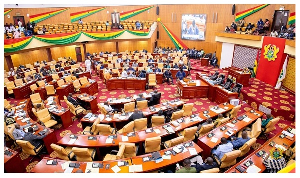Parliament’s passage of the Ghana Shippers’ Authority Bill, 2024, will go a long way to help streamline operations in the shipping industry.
Mr Emmanuel kofi Arku, the Director of Business Development and Commercial Service, Ghana Shippers Authority (GSA), speaking to the Parliamentary Press Corps at Parliament House in Accra, described the passage of the new law as a welcome news for the shipping industry in Ghana.
He noted that the law enabled the Authority to better adapt to emerging trends and complexities within the shipping and logistics industry.
He reiterated that the Authority was not going to implement the law unilaterally, and that they were going to engage industry players, who were all experts in the industry.
“Once, we agree on certain variables, and agree with certain rates, that is what we will apply and the law too sets the power to implement and enforce what we have agreed upon,” he said.
“So, the issue about somebody charging what they like, and they determine the issues demurrage, and it is charged and when people are not able to clear cargo because it is a holiday, yet they are being charged, all those things will have to be streamlined.”
Adding that because the law gives them the provisions to make further regulations as to how demurrage, et cetera, was to be charged.
“So, this is the law for everybody; for stakeholder, for freight forwarder, for the shipper, even for the shipping line, hither too when shipping lines have issues they have nobody to complain to but with this law, a shipping line can have recourse with Ghana Shipper’s Authority and complain if another service provider is treating them unfairly,” Mr Arku said.
“So, we have become like an abattoir in the industry to ensure that there is fairness for everybody and if there is fairness, then Ghana will become competitive in its international trade.”
On her part, Madam Sylvia Asana Dauda Owu, the Director of Operations at the GSA, said the new law would introduce transparency in the determination of port fees and charges, and would by that ensure that there was better accountability in the legal movement of international trade cargo across all of borders of Ghana.
She said the law further aims to make Ghana a preferred transit trade route for her landlocked neighbours, Burkina Faso, Mali, and Niger and overall, enhance the sector’s revenue contribution to the national purse.
The Bill, which amends its 50 years old establishment law, NRCD 254 (1974) will regulate commercial activities of shippers and would primarily address the issue of unfair and excessive charges that burden traders who use Ghana’s sea and airports, as well as land borders to ply their international trade.
Business News of Thursday, 8 August 2024
Source: GNA
Passage of Ghana Shippers' Authority bill to help streamline operations - GSA Director
Entertainment












